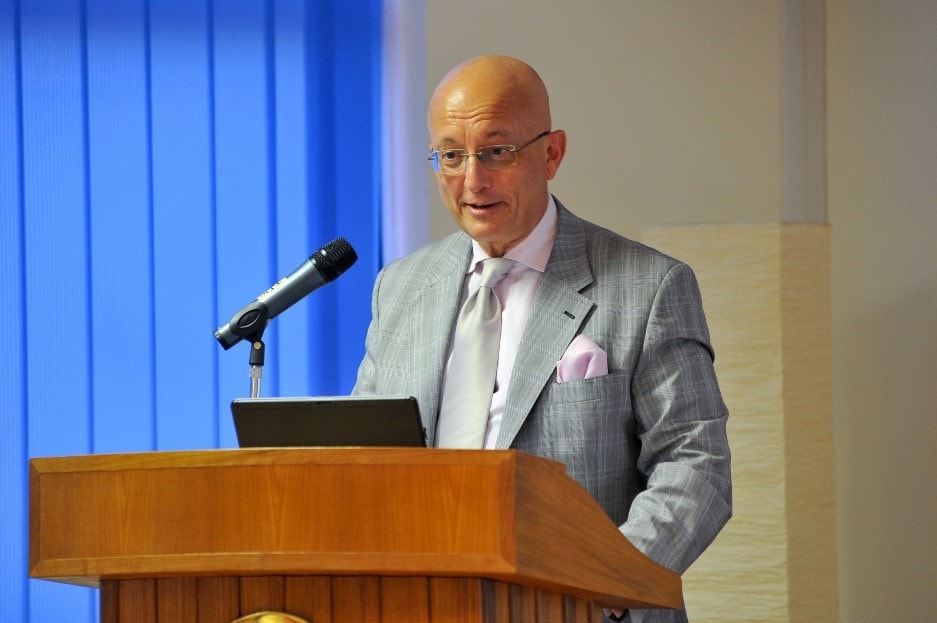The following report is a complimentary offering from the MEMRI Iran Threat Monitor Project (ITMP). For more information, write to memri@memri.org with "ITMP Subscription" in the subject line.
IRGC Aerospace Force commander General Amir-Ali Hajizadeh met with members of the Student Basij at Sharif University at the IRGC Aerospace Exhibition, and footage of the meeting was aired on Emtedad Online (Iran) on November 15, 2021. General Hajizadeh told the students that Iran does not need to strike targets on American soil, due to the significant U.S. presence in the region surrounding Iran. Claiming that the majority of American forces are present in the Middle East, General Hajizadeh said that Iranian pressure on American forces in the region is in response to the 2020 killing of IRGC Qods Force commander General Qasem Soleimani.
In addition, he said that Iranian security forces should have prevented the assassination of Iranian nuclear scientist Mohsen Fakhrizadeh and the recent cyberattack on the Natanz nuclear facility, and he blamed this failure in part on former Iranian President Rouhani's "pro-Western" government. General Hajizadeh also said say that strikes against Israeli ships, fires in Israel, and an explosion in an Israeli factory are all part of Iran's retaliation for the killing of Fakhrizadeh. Later in the meeting, General Hajizadeh added that Iranian forces are present "from the Red Sea to the Mediterranean Sea" and are no longer restricted to Iran's borders. Turning to the students, he said that since they are young, they will live see the day when the "Zionist regime" is annihilated.
To view the clip of IRGC Aerospace Force Commander General Amir-Ali Hajizadeh on MEMRI TV, click here or below.
Iran Should Have Been Building Fighter Planes As Actively As It Was Building Missiles
Student: "It seems that our military doctrine has focused in recent years on defense and deterrence. The practical manifestation of this doctrine in the military field has focused on the missile industry. Why has this doctrine manifested itself in the missile industry, and to what extent could we have developed other industries?"
General Amir-Ali Hajizadeh: "In the entire aerospace complex, our responsibility is like you said: missiles, obviously UAV's, radar systems, air-defense, and all the space projects.



[...]
"Building fighter planes is the responsibility of others, and they should provide the answers in this regard. Some things have been done, but in my view, it is not enough. In the area of building fighter planes, we could have been as active as we have been with the missiles. In any case, the people who were responsible should provide the answers. I do agree that we are behind in this field."
Student: "It has not been the responsibility of the IRGC?"
Hajizadeh: "No, no."
[...]
"Maintaining Deterrence Is Like Riding A Bicycle... You Have To Keep Pedaling All The Time"
Student: "Does building a missile that can hit Israel – a missile with a 2,500-kilometer range – constitute the pinnacle of deterrence by our defense and missile industries or is there something beyond that?"
Hajizadeh: "Maintaining deterrence is like riding a bicycle. When riding a bicycle, you have to keep pedaling all the time, or else, the bicycle will fall. Therefore, deterrence does not mean that you reach a certain point, and then you frame it, put it in some corner, and say that you have deterrence. No. You have to preserve it.
[...]
"There is a logic behind what we in the Islamic Republic of Iran have done. We have not embarked on an arms race.
[...]
"Some countries is the region – you cannot call them 'countries.' You could fit them in two hotels... However, you can see that their military expenditure exceeds ours.
[...]
"It is true that currently, we do not have an enemy beyond 2,000 kilometers, but this does not mean that [this range] is beyond out capabilities. We actually do have that capability, but there is no need for it. As I've said, we proceed with logic. You may have seen that in recent years, the enemies do not dare to act against us. There was a time when they downed an Airbus of ours, in our own territorial waters, and there was nothing we could do about it. They did not even apologize. But now, their ultra-advanced spy plane entered a few hundred meters, or a few kilometers into our territorial waters, we downed it, and they were uncapable of retaliating."



[...]
"America's Investments In The Region Are Numerous; The Main Force Of The American Military Is Here... Logic Dictates That We Hit Them Close To Here [Rather Than On American Soil]"
Student: "We see that the U.S. keeps military bases near the Islamic Republic, and its warships and other vessels are active in our southern waters. If something happens and the U.S. threatens Iran with these ships, is there something we can do to threaten the American soil? Do we have this capability?"
Hajizadeh: "Look, I will answer with another question. We need to examine whether in order to overcome America and stop it, or in order to retaliate against a possible American action, we need to invest so much in order to reach American soil. In my humble opinion, the answer is no. Why? Because America's investments in this region are numerous. The main force of the American military was here. Now they want to cut these forces down a bit, but America's main force is still here. If we can attack their forces with a rather small cost, logic dictates that we hit them close to here. Why would we want to go 10,000 kilometers away?


[...]
"[The] Heavy Pressure That Is Exerted On The Americans Is The Result Of [Soleimani's] Blood; They Should Be Held Accountable"
"As a counter [measure] to the assassination of Hajj Qasem [Soleimani]... Driving [the Americans] out of the region, and of course, the persecution of the people who gave the orders and carried this out, as week as other actions, have entered [our] agenda. This heavy pressure that is exerted on the Americans is the result of [Soleimani's] blood. They should be held accountable.


"After all, the resistance axis all over the region, as well as Iran – in fact, we are all part of the resistance axis – are exerting efforts [in this regard], but all should be done logically. If we make emotional decisions, it's not clear that the result will be good. We should proceed logically. Are we afraid? No. You saw that we hit Ayn Al Asad Airbase. Prior to that, we hit their [RQ-4A] airplane. There have also been many actions that I am not at liberty to discuss here.
[...]
"[Iran Has] A Presence From The Red Sea To The Mediterranean Sea; We Have This Power That Has Spread Throughout The Region"
"Currently, we have a presence from the Red Sea to the Mediterranean Sea. We have this power that has spread throughout the region. In the past, we had to defend ourselves in Tehran and within our borders, but now we have become so powerful and so self-sufficient. And what happened to them? From day to day, they retreat more and become more vulnerable. After all, we are following the news.
"You say that things happened also within Iran – like the death of the martyr Fakhrizadeh or what happened in Natanz. Ultimately, this is an exchange of blows. It is true that our security within our country has taken a hit. The security forces should have acted properly, tracked and caught those groups in time, but there was a failure. In part, I believe it was because [Rouhani's] pro-Western government believed the [Americans], trusted them, and refused to accept some of our [warnings]."



[...]
Student: "You called this 'an exchange of blows.' But what we actually see is that in most cases, they give us a beating, and we do not react at all."
[...]
Hajizadeh: "Just like you, we have heard about them getting beaten. Their ships are targeted and blow up. We hear that sometimes there are fires. Sometimes we hear that a certain factory exploded somewhere, and that other things happened elsewhere."
[...]
"Young People Will See The Day When [The Israeli] Regime Is Annihilated, Whether I Am Still Here Or Not"
Student: "Specifically with regard to the martyr Fakhrizadeh – Israel has almost claimed official responsibility for doing this. All the media outlets reported that Israel had done it. It is clear that Israel hit..."
Hajizadeh: "I heard that in Erbil, in Iraqi Kurdistan, and elsewhere, the Israelis had many casualties. I heard that too.
[...]
"As long as we live, we take action. Everybody does. They are all ready to die as martyrs, They work day and night. Iran and our regime will definitely continue to exist, whereas the Zionist regime is transient. This is certain.


[...]
"Rest assured that you young people will see the day when this regime is annihilated, whether I am still here or not."






